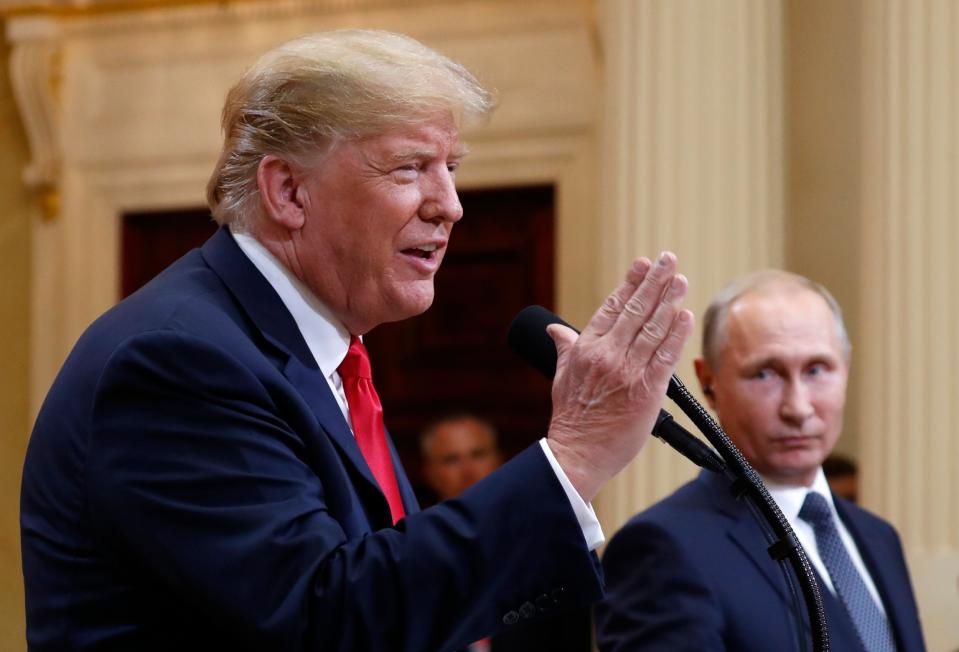Donald Trump's presidency is full of risks that are helping nobody but Russia
Even by his own bombastic standards, for Donald Trump to get up at a joint press conference and denounce his own intelligence agencies was quite something. This was no deft, nuanced, damning with faint praise, disdainful dismissal, either. It was the sort of overstated all-out attack he used to reserve for Hillary Clinton, who made another appearance on the international political stage, as an increasingly exasperated President Trump tried to distract attention from the allegations about his own presidential campaign.
As ever, he may be right about secretary Clinton’s missing 33,000 emails; but that does nothing to absolve him, and nothing to excuse the violence of his attacks on the FBI. Normally, an attack such as this in the presence of the US president by a Russian leader would spark a diplomatic incident.
This was the performance of a president more rattled by his own security forces than he is about those of the Russian federation. For Mr Trump what is going on is “a witch hunt”. “There is no collusion.” “Zero collusion”. The Mueller probe is, so the head of the executive branch of the US government declared, “a disaster for our country”. “It was a clean campaign.” The allegations are “ridiculous.” America’s commander-in-chief rained fire and fury down – on his own agencies and officers.
Needless to say, it’s no surprise that Mr Trump didn’t press the allegations against 12 Russian military intelligence GRU officers.
It is interesting how frequently the president chose to use the phrase “no collusion”, or variants of it. It suggests very much that there were contacts between the Russians broadly, and the Trump camp, broadly, but President Trump wishes to set a high bar for any possible concrete allegations made against him – specifically collusion, a harder test than some others.
It may well be that the Russians provided the Trump campaign with intelligence and leaks, directly or via Wikileaks, and they made use of them, but without close-range collusion. The Mueller inquiry will determine that. Mr Putin helpfully suggested only a court trial could do so.
If only that was the only depressing aspect of this mini-summit. At times Mr Trump sounded almost statesmanlike, preferring jaw jaw to war war. But there was little to suggest that America is yet securing a new relationship with the Russians by doing anything else than selling out.
Fresh from a major propaganda coup of his own, the Fifa World Cup finals, Vladimir Putin must feel well pleased that his protagonist has spent the past few days winding up his Nato allies generally, insulting Germany, describing the European Union as a “foe”, and humiliating Theresa May. Perhaps President Trump feels that his brand of fresh diplomacy is to confront his friends and allies; and to appease an expansionist and aggressive Russia that has proved itself willing to subvert democracy even in the United States itself. It is irrational.
No one wishes to return to the days of the Cold War. Yet Donald Trump and Vladimir Putin (more surprisingly) betrayed a deliberate ignorance of history when they said US-Russian relations have never been worse – successive postwar crises over Berlin, Hungary, Cuba, the Czech spring, Vietnam and Afghanistan were surely worse episodes, let alone the dispatch of American troops to take part in the Russian civil war a century ago.
Still, this was no history lesson. What it was, though, was a flawed attempt by Donald Trump to assert his prowess as a dealmaker and deliver on another campaign promise – to make peace with Russia. Having publicly invested so much political capital on the pledge, he risks having to fulfil at too high a price for the American national interest, and the interests of the west more broadly.
The worst fears were not realised. There was no sacrifice of Ukraine or Crimea in return for a Russian hand in taming Iran, but both men left that hanging in the air, for future trading.
There is something to be said for personal diplomacy and the “bold” diplomatic tradition that President Trump cited. When Richard Nixon, the great Cold War warrior, opened relations with Mao’s “Red China” in 1972, he changed the course of world history.
A “walk in the woods” in more orderly diplomatic times, between Ronald Reagan and Mikhail Gorbachev, achieved much in the 1980s. Many on all three sides – the US, Russia, China – of the old Cold War took risks for peace. Yet so far there is little sign that the risks Mr Trump is staking are actually yielding much of a dividend for anyone. Except Russia.

 Yahoo News
Yahoo News 

